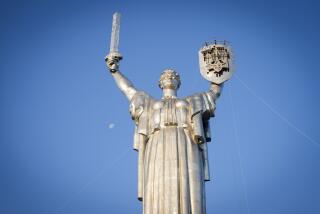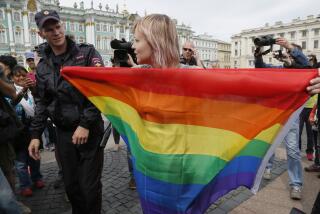A New-Old Russian Anthem OKd
- Share via
MOSCOW — Russian lawmakers scrapped the country’s post-Soviet national anthem Friday and voted to reinstate the melody of its Communist-era anthem instead--a gesture proponents called a step toward social reconciliation and critics denounced as a move toward repression.
President Vladimir V. Putin proposed the switch in an address to the nation this week, saying that restoring the rousing “Unbreakable Union” anthem composed under dictator Josef Stalin could help reunite his fractured society.
“Is it really true that in the Soviet period of our country’s existence, we have nothing else to recall but Stalin’s camps and repressions?” Putin asked.
“If we agree with those who say we should not use the symbols of past epochs, including the Soviet epoch, we will have to agree that our mothers and fathers lived useless, senseless lives. . . . I cannot accept this either in my head or in my heart.”
The move is Putin’s boldest to date toward unraveling the legacy of former President Boris N. Yeltsin, who presided over the collapse of the Soviet Union but was unable to build a social or political consensus on Russia’s future.
Yeltsin tended to demonize his Communist opposition and during his tenure presented the choice facing his country as either moving forward to democracy or backward to communism. When the Soviet Union was dismantled, he adopted czarist-era state symbols by decree: the Russian tricolor flag, the double-headed eagle as the state emblem and a tune known as “Patriotic Song,” composed by Mikhail Glinka, as the national anthem. They were never formally adopted by parliament, which for most of his tenure was dominated by the Communists and their allies.
Since Yeltsin’s resignation a year ago, the Communist/anti-Communist divide has softened. The largest party in parliament, the pro-Putin Unity bloc, has openly allied with the Communist Party on a number of issues. And the proposal to restore the old anthem was clearly aimed at drawing the Communists and their adherents deeper into the national debate.
“When this decision comes into effect, I will get up with pleasure at 6 o’clock in the morning and will listen with pride and with joy to the anthem of the Soviet Union. This will be the moment of clarity and truth our people have been so looking forward to,” said Yegor K. Ligachev, 80, a Communist Party patriarch and the former Politburo member who spearheaded a drive to oust Yeltsin from the party in the mid-1980s.
For his part, Yeltsin publicly lambasted his chosen heir for the first time since this summer’s Kursk submarine disaster, saying he “categorically” opposes the anthem change.
“There is only one thing that I associate with the old national anthem--party congresses and party conferences at which party bureaucrats consolidated their power,” Yeltsin said in an interview with the Komsomolskaya Pravda newspaper.
What Putin proposed was a hodgepodge of the Communist and czarist. He noted that prerevolutionary Russia was hardly a beacon of democracy and was “known in its time, not without reason, as a prison of nations, an empire in which there were people who were suppressed and in which there were dissidents.”
In addition to restoring the anthem, lawmakers gave robust approval to the other state symbols proposed by Putin: the former czarist tricolor and double-headed eagle as the national flag and state emblem. And they agreed to give the armed forces their own flag--a red banner minus hammer and sickle.
Putin said the Communist-red flag should be brought back for use by the military because it is “our people’s banner of victory in the Great Patriotic War,” the Russian name for World War II.
The Duma, the lower house of parliament, adopted Putin’s proposals with lightning speed--in just four days--and with a thunderous majority--381 to 51. They must still be approved by the upper house, the Federation Council, and signed by Putin, but both steps are considered procedural.
Putin may have hoped that the reintroduction of Communist heraldry would bring new consensus to Russian society, but in the short term it has had the opposite effect: A vehement and divisive debate has erupted over whether the Soviet period should be embraced or denounced as part of Russian history.
In particular, the move has incensed liberals and intellectuals, who contend that it is part of an effort to whitewash the past and avoid coming to terms with the crimes of history.
“The dark truth is that, with few exceptions, all Soviet citizens were, consciously or unconsciously, accomplices in the 70-year Soviet oppression,” wrote liberal commentator Yevgenia Albats. “Putin is trying to take upon himself the role of a priest who absolves us of these sins. But he is not entitled to do so as he participated in the crime.”
A prominent group of intellectuals and cultural figures signed an open letter to Putin this week saying that restoring the old melody “flouts [our] convictions and insults the memory of the victims of Soviet political repressions.”
Liliya F. Shevtsova, a political analyst with the Carnegie Foundation’s Moscow Center, said that unlike Yeltsin, Putin is not demonstrating leadership but trying to forge compromises and coalitions that may be unworkable.
“He keeps promising something to the Communists and something to the liberals,” she said. “There is no strategy in it. This is a hollow policy of boosting his ratings, and in the long run it is strategically destructive for Putin himself.”
Indeed, in his speech Putin in effect acknowledged that he was playing to the polls, noting that a majority of Russians favor the grandiose Stalinist anthem composed by Alexander Alexandrov over the less melodic song by Glinka.
Leonid A. Sedov, a historian with the Russian Center for Public Opinion Research, said the polls do show that the public favors the Soviet melody by a wide margin, 46% to 26%. And most associate it not with Stalin but with what they see as an easier, more prosperous life under the Communists.
“The people who want the old anthem back are mostly elderly and poorly educated, and they are simply being nostalgic for the old times,” he said. “It is not surprising that 56% of our respondents think that life was better under [Soviet leader Leonid I.] Brezhnev. It is not true, of course, but how can you blame them for missing their bygone youth, their achievements and victories?
“This is a classic case when a majority is not right,” he added. “A national anthem must not disgust even some part of the population. We know too well that there are a lot of people in this country who can’t hear this anthem without shuddering.”
Far from putting the issue to rest, parliament’s adoption of the Communist-era music may open only another, perhaps more contentious battlefront in Russia’s war of symbols: the lyrics.
One of the principal complaints about the Glinka anthem is that no words were ever adopted to go with it. In Stalin’s time, the old anthem glorified Vladimir I. Lenin and Stalin and the “unbreakable union of free republics”--words that are clearly no longer suitable. But Putin has not yet proposed new lyrics, leaving Russians to either sing the old ones or hum wordlessly.
Russian satirist Vladimir Voinovich leaped into the breach this week, proposing his own words, which echo those of the original:
The unbreakable union has crumbled forever,
and now Great Russia stands at the crossroads.
Whether or not she will long remain free
Is a question I dare not try to foresee.
*
Sergei L. Loiko of The Times’ Moscow Bureau contributed to this report.
More to Read
Sign up for Essential California
The most important California stories and recommendations in your inbox every morning.
You may occasionally receive promotional content from the Los Angeles Times.













